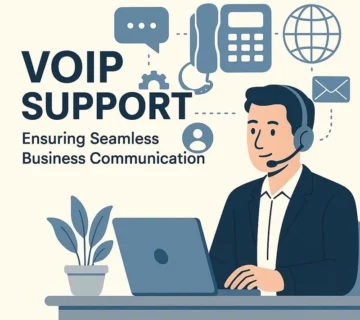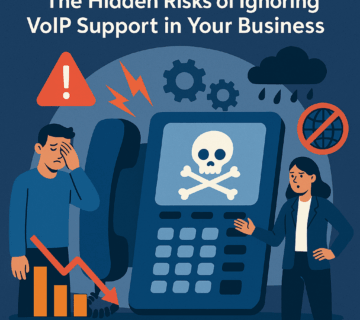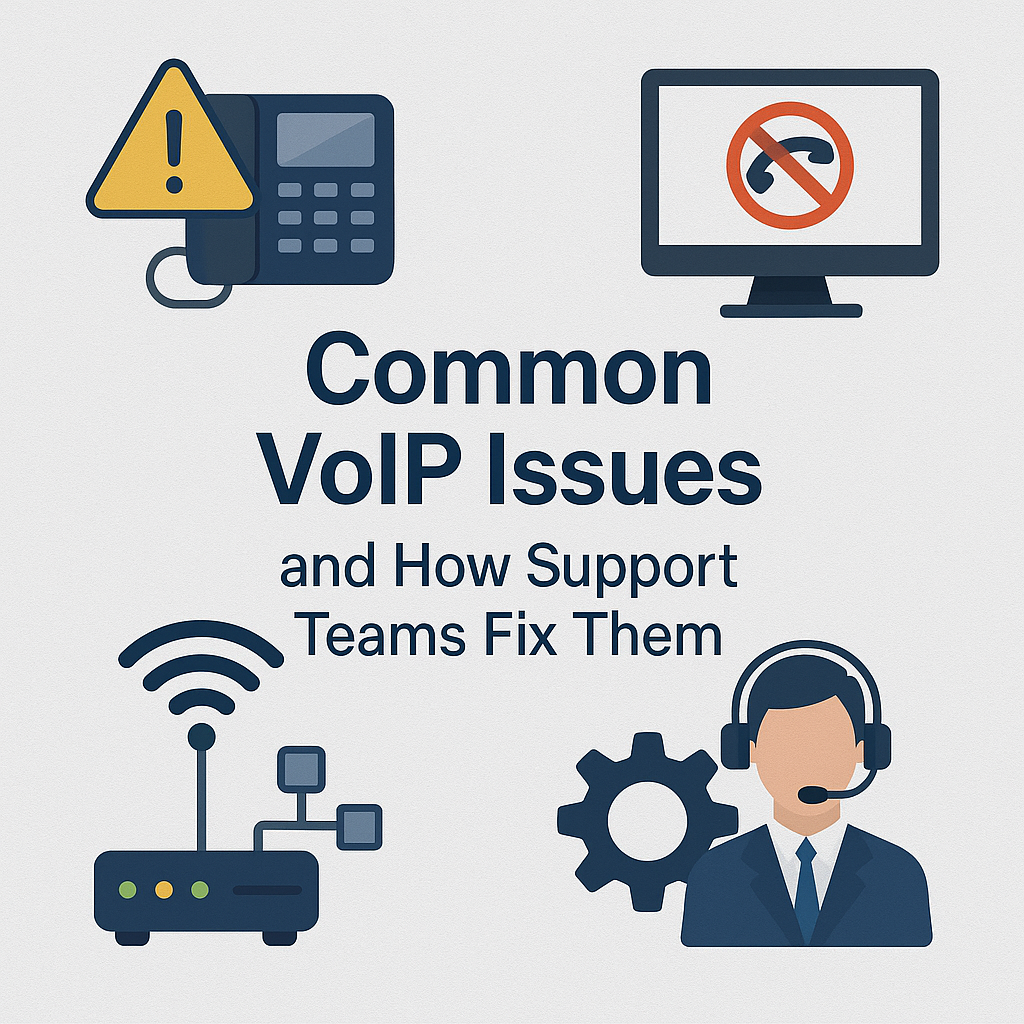Why VoIP Support Is Essential for Cybersecurity Compliance
Introduction: The VoIP–Cybersecurity Connection
Voice over Internet Protocol (VoIP) has transformed modern business communication—replacing traditional phone systems with scalable, internet-based calling. While this offers flexibility and efficiency, it also introduces new security risks that can compromise regulatory compliance.
VoIP support plays a critical role in ensuring that these modern communication systems meet rigorous cybersecurity and compliance requirements. As businesses adopt advanced business VoIP solutions, they must prioritize security controls equal to those used for email, cloud storage, and customer databases.
Compliance Requirements Across Industries
1. HIPAA for Healthcare Organizations
Healthcare providers must protect patient conversations under HIPAA regulations. When using VoIP, they must implement encryption, access restrictions, and logging to secure Protected Health Information (PHI).
Top business VoIP providers for the healthcare sector ensure HIPAA compliance through purpose-built infrastructure and real-time support.
2. PCI DSS for Financial Services
Financial institutions and payment processors using VoIP must comply with PCI DSS by protecting cardholder data in voice communications. This includes call encryption, access logging, and traffic isolation.
Small business VoIP providers servicing finance clients need to deliver enterprise-grade features that meet PCI DSS requirements while being scalable for smaller teams.
3. SOX for Public Companies
Public companies must comply with the Sarbanes-Oxley Act (SOX), which requires integrity in financial communications. VoIP systems used in financial reporting must be auditable, secure, and tamper-proof.
VoIP security solutions help implement controls that prevent unauthorized access to financial data and ensure auditability.
Common VoIP Security Risks
Voice Traffic Interception
One of the top VoIP security threats is the interception of unencrypted voice data. Attackers can eavesdrop on sensitive conversations and compromise regulatory compliance.
VoIP support must include SRTP, TLS, and VPN tunneling to protect against interception.
Denial of Service (DoS) Attacks
DoS attacks on VoIP systems can halt business communications, breaching service availability standards. These are a major concern for VoIP business continuity planning.
VoIP features for small businesses 2025 should include redundancy, traffic shaping, and cloud failover mechanisms to protect against these attacks.
Weak Identity and Access Controls
Lack of authentication opens doors to unauthorized access, exposing confidential conversations.
Desktop support issues and solutions often include poor password policies or misconfigured VoIP access, both of which must be corrected by trained professionals.
The desktop support engineer future scope includes specialization in VoIP systems, security configurations, and compliance monitoring.
Implementation Strategies for Secure VoIP
Network Segmentation
Proper segmentation ensures VoIP traffic is isolated from the broader network. VLANs and firewalls reduce the attack surface and aid compliance.
Encryption and Secure Protocols
Protocols such as SRTP and TLS must be implemented and maintained to protect communication data from interception and tampering.
Monitoring and Incident Response
Advanced VoIP systems must integrate with SIEM and IDS tools for real-time monitoring, automated incident detection, and compliance reporting.
Best Practices for VoIP Cybersecurity Compliance
Regular Security Assessments
Annual penetration testing, vulnerability scans, and configuration reviews are essential for regulatory compliance.
Documentation and Audit Trails
Maintaining records of VoIP configurations, access logs, and security incidents supports compliance audits.
Employee Training and Awareness
End-user education is essential to reduce risk and maintain compliance. VoIP support should include ongoing training sessions for employees on secure usage and phishing prevention.
Cost vs. Risk: Why VoIP Support Pays Off
Avoiding Compliance Penalties
Regulatory penalties and legal liabilities for data breaches often far exceed the cost of affordable VoIP service. Proactive investment in security-focused VoIP support is a smart risk management decision.
Improving Operational Efficiency
Reliable VoIP systems reduce downtime, improve call quality, and enhance business communication.
When choosing from the best VoIP providers 2025, prioritize those offering robust support for compliance, security, and uptime.
Managing Risk Proactively
Top business challenges solved by VoIP include inefficient communication, high phone bills, poor scalability, and weak data protection. With the right provider, organizations can address these issues while aligning with compliance standards.
Future Trends in VoIP Security
AI and Machine Learning
AI tools will drive faster threat detection, smarter analytics, and automated response—all becoming essential to VoIP security compliance.
Zero Trust Architecture
The zero trust model—requiring constant verification—will become the default for securing VoIP communication, especially for remote and hybrid teams.
Evolving Regulations
Cybersecurity regulations will continue to evolve. Organizations must stay agile with scalable and adaptive VoIP support to meet emerging standards.
Frequently Asked Questions (FAQ)
Q1: Why are VoIP systems more vulnerable than traditional phones?
They operate over IP networks, making them susceptible to digital threats like eavesdropping, spoofing, and denial of service.
Q2: How do VoIP compliance requirements vary across industries?
Healthcare requires HIPAA, finance must follow PCI DSS and SOX, and government contractors often comply with FISMA—all with different security expectations for VoIP.
Q3: What are the most common VoIP compliance violations?
Unsecured voice traffic, missing access logs, improper user controls, and lack of monitoring or documentation.
Q4: How often should VoIP security be assessed?
Most frameworks require annual assessments, with monthly and quarterly reviews recommended for higher-risk environments.
Q5: What encryption protocols are best for VoIP?
SRTP for voice traffic, TLS for signaling, and AES for data—all standard in secure VoIP systems.
Q6: Are cloud-based VoIP systems compliant?
Yes—if configured correctly and supported by vendors who meet industry regulations.
Q7: What documentation is needed for VoIP compliance audits?
Security policies, diagrams, access lists, incident logs, monitoring reports, and evidence of training and testing.
Q8: How does VoIP support help with incident response?
By providing monitoring tools, alerts, response procedures, forensic analysis, and audit-ready documentation.
Conclusion
VoIP support is not just a technical service—it’s a compliance necessity. Organizations that fail to secure their VoIP systems risk penalties, data breaches, and customer trust.
By investing in professional support and choosing from the top business VoIP providers, companies can ensure they meet regulatory standards, maintain communication integrity, and protect sensitive data.
As regulations tighten and cyber threats advance, the businesses that embrace secure, compliant VoIP support will stand out—safer, more reliable, and more future-ready.





No comment